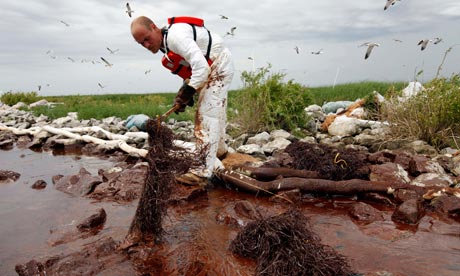Five months after BP oil rig disaster, US government declares well 'dead'
US still counting financial and environmental cost of the disaster

The US government has declared the blown-out BP well in the Gulf of Mexico, which caused the biggest oil spill in American history, "effectively dead" after a final plug of cement was pumped in.
Five months after the explosion that killed 11 workers on the Deepwater Horizon rig and let loose millions of barrels of crude oil, the well passed a pressure test yesterday that confirmed it was sealed about 5,000 metres below the sea bed.
"We can finally announce that the Macondo 252 well is effectively dead," said Thad Allen, the former coast guard admiral heading the government response to the spill. Allen declared that the well "poses no continuing threat to the Gulf of Mexico".
The spill was brought to a halt in July with a temporary cap while a relief well was completed. That well finally reached the main shaft on Thursday, permitting the cement plug to be pumped in.
Barack Obama hailed the news as an "important milestone" and praised those who "worked around the clock to respond to this crisis and ultimately complete this challenging but critical step to ensure that the well has stopped leaking for ever".
Obama said the government remained committed to helping communities along hundreds of miles of Gulf coast recover from the disaster.
BP is still counting the cost of the disaster. It was forced by the US government to establish a $20bn compensation fund. Nearly 70,000 people or businesses have lodged claims mostly for loss of earnings or profits. So far about one in four have been paid although some of the recipients say with cheques far lower than their claims. The majority come from Florida and Louisiana.
BP last week refused to process a claim by the state government of Alabama for $148m in lost income tax revenues because workers have lost their jobs or have diminished earnings as a result of the spill. The company is also facing about 400 lawsuits and many more are likely to be filed.
BP is estimated to have paid $8bn so far in clean-up costs. It has launched a national advertising campaign that promises to make right the damage caused by the spill. The environmental toll is still being assessed but thousands of dead birds, turtles and other wildlife have been found even if the impact is not as great as initially feared.
The debate over where the spilled oil has gone continues. Last month the government said that nearly three-quarters of it had evaporated, been devoured by living organisms or scooped up. But some scientists claim that a massive plume of oil remain in the Gulf of Mexico with some of it having settled on the sea bed.
Earlier this month, BP published its own findings into the causes of the disaster. It accepted a partial share of the blame for the blowout but also accused a contractor, Halliburton, of sub-standard work at the well head which led to the disaster and the owner of the rig, Transocean, for the failures of the blowout preventer on the ocean floor.
The blowout preventer, a series of valves designed to stop a surge of oil and gas, is being held at a Nasa facility in New Orleans to await examination next month.
BP's position is widely viewed as establishing its legal strategy as it faces fines and possible prosecution over the disaster. (the guardian)
No comments:
Post a Comment